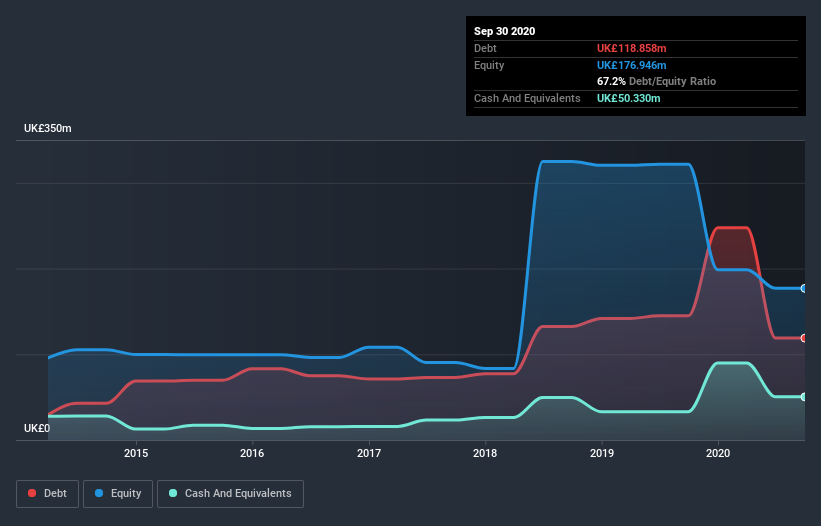
Warren Buffett famously said, 'Volatility is far from synonymous with risk.' It's only natural to consider a company's balance sheet when you examine how risky it is, since debt is often involved when a business collapses. We note that Hyve Group Plc (LON:HYVE) does have debt on its balance sheet. But the more important question is: how much risk is that debt creating?
When Is Debt A Problem?
Debt is a tool to help businesses grow, but if a business is incapable of paying off its lenders, then it exists at their mercy. Part and parcel of capitalism is the process of 'creative destruction' where failed businesses are mercilessly liquidated by their bankers. While that is not too common, we often do see indebted companies permanently diluting shareholders because lenders force them to raise capital at a distressed price. By replacing dilution, though, debt can be an extremely good tool for businesses that need capital to invest in growth at high rates of return. When we examine debt levels, we first consider both cash and debt levels, together.
See our latest analysis for Hyve Group
What Is Hyve Group's Net Debt?
As you can see below, Hyve Group had UK£118.9m of debt at September 2020, down from UK£144.8m a year prior. However, it also had UK£50.3m in cash, and so its net debt is UK£68.5m.

How Healthy Is Hyve Group's Balance Sheet?
We can see from the most recent balance sheet that Hyve Group had liabilities of UK£148.2m falling due within a year, and liabilities of UK£132.0m due beyond that. Offsetting this, it had UK£50.3m in cash and UK£23.9m in receivables that were due within 12 months. So its liabilities total UK£206.0m more than the combination of its cash and short-term receivables.
This is a mountain of leverage relative to its market capitalization of UK£288.9m. Should its lenders demand that it shore up the balance sheet, shareholders would likely face severe dilution. There's no doubt that we learn most about debt from the balance sheet. But ultimately the future profitability of the business will decide if Hyve Group can strengthen its balance sheet over time. So if you want to see what the professionals think, you might find this free report on analyst profit forecasts to be interesting.
Over 12 months, Hyve Group made a loss at the EBIT level, and saw its revenue drop to UK£105m, which is a fall of 52%. To be frank that doesn't bode well.
Caveat Emptor
Not only did Hyve Group's revenue slip over the last twelve months, but it also produced negative earnings before interest and tax (EBIT). Its EBIT loss was a whopping UK£69m. Considering that alongside the liabilities mentioned above does not give us much confidence that company should be using so much debt. Quite frankly we think the balance sheet is far from match-fit, although it could be improved with time. We would feel better if it turned its trailing twelve month loss of UK£304m into a profit. So we do think this stock is quite risky. When analysing debt levels, the balance sheet is the obvious place to start. However, not all investment risk resides within the balance sheet - far from it. For example, we've discovered 2 warning signs for Hyve Group (1 can't be ignored!) that you should be aware of before investing here.
If you're interested in investing in businesses that can grow profits without the burden of debt, then check out this free list of growing businesses that have net cash on the balance sheet.
If you decide to trade Hyve Group, use the lowest-cost* platform that is rated #1 Overall by Barron’s, Interactive Brokers. Trade stocks, options, futures, forex, bonds and funds on 135 markets, all from a single integrated account. Promoted
Valuation is complex, but we're here to simplify it.
Discover if Hyve Group might be undervalued or overvalued with our detailed analysis, featuring fair value estimates, potential risks, dividends, insider trades, and its financial condition.
Access Free AnalysisThis article by Simply Wall St is general in nature. It does not constitute a recommendation to buy or sell any stock, and does not take account of your objectives, or your financial situation. We aim to bring you long-term focused analysis driven by fundamental data. Note that our analysis may not factor in the latest price-sensitive company announcements or qualitative material. Simply Wall St has no position in any stocks mentioned.
*Interactive Brokers Rated Lowest Cost Broker by StockBrokers.com Annual Online Review 2020
Have feedback on this article? Concerned about the content? Get in touch with us directly. Alternatively, email editorial-team (at) simplywallst.com.
About LSE:HYVE
Hyve Group
Hyve Group Plc engages in in the organization of trade exhibitions, conferences, and related activities.
Adequate balance sheet with reasonable growth potential.
Similar Companies
Market Insights
Community Narratives



